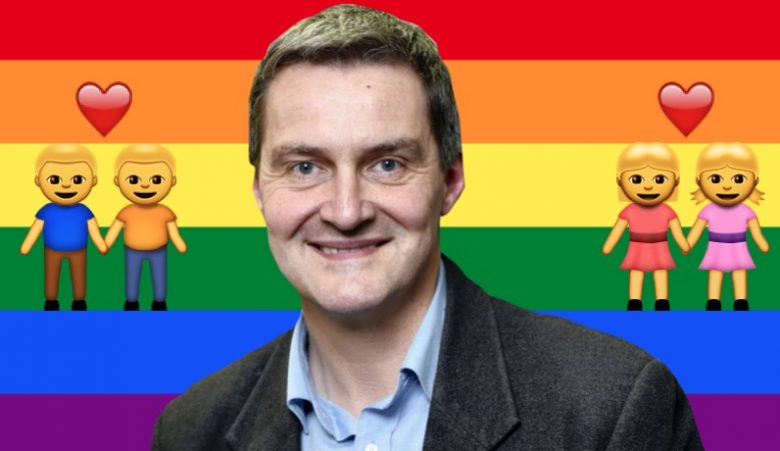
Marriage Equality Now: We Speak To Rodney Croome About The Plebiscite & Same-Sex Marriage Action
As Midsumma Festival in Melbourne parties on, the city prepares for Pride March this Sunday, with the befitting theme of ‘Marriage Equality’. TheVine.com.au spoke with the Director of Marriage Equality Australia, Rodney Croome on where the nation sits in regards to legalising same-sex marriage in 2016.
Last year, marriage equality milestones in the form of Ireland’s successful referendum and the United States’ Supreme Court ruling ignited calls for equality at home. However, Croome says that he doesn’t believe Australia needs to be kick-started by action abroad, saying:
“I think the majority of Australia would like to resolve this issue as quickly as possible and will see the issue return to centre stage regardless of what happens oversees”
The most recent poll found that 72 percent of those surveyed support same-sex marriage in Australia. To compare, the level of support for equal marriage rights in Ireland before the referendum was at around 71 percent.
As a similiar public vote in Australia, the idea of a pubic plebiscite on the issue was originally proposed back in August when Tony Abbott was still Prime Minister. But whether it should go ahead has many ramifications, said Croome.
“It will cost – according to the Australian electoral commission – $160 million dollars.
That money could be spent on a number of other useful ways, for that money we could employ 500 nurses, or 600 public school teachers or support over 2000 university graduates, so I think most Australian would prefer the money spent in ways such as that,” Croome explained.
What is the point of spending $160 million when Eric Abetz says he will ignore result of @TurnbullMalcolm marriage equality plebiscite?
— Tanya Plibersek (@tanya_plibersek) January 27, 2016
“The other thing to know about the plebiscite is that it’s not binding. If we go through the process of the plebiscite and spend $160 million dollars, the issue will still return to Parliament and as we’ve seen in the last couple of days, conservative MPs will still vote against it.
So the question is: why? Why go through this process if it’s not going to make a difference? It still has to be decided by politicians so let’s just go on and vote in Parliament now.”
In the last few days some conservative Senators have warned they may vote against same-sex marriage, regardless of the result of a plebiscite poll. Conservative Liberal Senator, Eric Abetz said he will most likely vote ‘no‘, adding that the public’s vote would not automatically lead to changes to coalition policy. Nationals Senator, Bridget McKenzie has since echoed similar sentiments, also pledging to oppose same-sex marriage in Parliament, regardless of the outcome of a plebiscite.
With this news, the expensive execution of a plebiscite is reared practically pointless. The Age today published the editorial ‘Bring on same-sex marriage bill now’ urging Prime Minister Turnbull to skip the wasted public vote.
Croome added that instead of a plebiscite, the coalition should just cut to a conscience vote.
“I think the sensible thing for Malcolm Turnbull to do is to abandon the idea of a plebiscite and instead take this issue back to Parliament and allow a free vote for coalition party members. I think if that was to occur, it would be an easily resolved issue,” said Croome.
“If we abandon the idea of a plebiscite and go straight through to a free vote in parliament, then it’s likely to get through and that can happen before Easter.”
Is it this?
1. We don't support a conscience vote
2. Hold a plebiscite
3. Allow a conscience vote so MPs can vote against people's decision— ???? Tim Beshara (@Tim_Beshara) January 28, 2016
Croome also worries about the psychological impact of a plebiscite on the lives and minds of LGBTIQA people and families.
“It will be polarizing. I fear it will have an adverse impact on the mental health of LGBTI people and also the children of same-sex couples, particularly when that hear some of the more hateful statements that will be made by opponents of marriage equality,” said Croome.
As a group that disproportionately suffers higher levels of mental health problems including anxiety, depression and suicide; a public campaign may only further stigmatize. Croome warns that religious factions could also be negatively affected from the public vote.
“I think the faith community will also suffer. Resources may be diverted from the important charity work these churches do, to the plebiscite and I don’t think anyone wants to see that,” adding “It will be polarizing in some church communities. It will expose people of faith that have said ‘yes’ to the idea to reconsider their views and how destructive it might be”.
Despite some of the political, social and economical consequences that a plebiscite could bring, the majority of the public support the idea. As reported in The Australian, a survey found that 76 per cent of people wanted a plebiscite to be held before MPs change the traditional definition of marriage.
It’s time for Malcolm Turnbull to show some leadership and end this farce – we need a vote! https://t.co/9JxzJ9RvgN pic.twitter.com/9DcJzTxOoU
— Robert Simms (@SimmsRobert) January 28, 2016
While a majority of the public are for marriage equality, they want the decision to be in their hands, rather than that of the politicians.
In January alone, we have seen the tragic case of South Australian law not recognising the marriage of Marco Bulmer-Rizzi and husband David Bulmer-Rizzi, one of whom had passed away. As South Australia does not recognise same-sex marriages performed overseas, David’s death certificate read “Never Married”. Croome said instances like this show how progressively backwards the nation is appearing to the international community.
“It tarnishes Australia’s reputation as an inclusive and tolerant country and I think most Australians are embarrassed by what happened. Most Australians would think that Marco and David should be given legal protections,” said Croome.
South Australian premier, Jay Weatherill announced he will introduce legislation to recognise overseas same-sex marriages to the South Australian Parliament by the end of the year and David’s death certificate will be rectified and reissued. But Croome said he doesn’t think this all needs to be so complicated.
Love is a human right. It's time for Australia to catch up on marriage equality. https://t.co/fajSWSZLPi pic.twitter.com/pABf9ePwTq
— Amnesty QLD & NNSW (@AmnestyQLDNNSW) January 6, 2016
“The ultimate solution to this lies not in state law but in federal law and it lies in amendment to the Marriage Act and I hope the international embarrassment that we have suffered over this case will prompt the federal government to act on this issue more quickly,” said Croome.
Croome refers to a bill that will change the Marriage Act which currently excludes all types of marriage other than that between one man and one woman.
If Prime Minister Turnbull does go ahead with a plebiscite vote, Croome warns that marriage equality will be stagnated until 2017.
